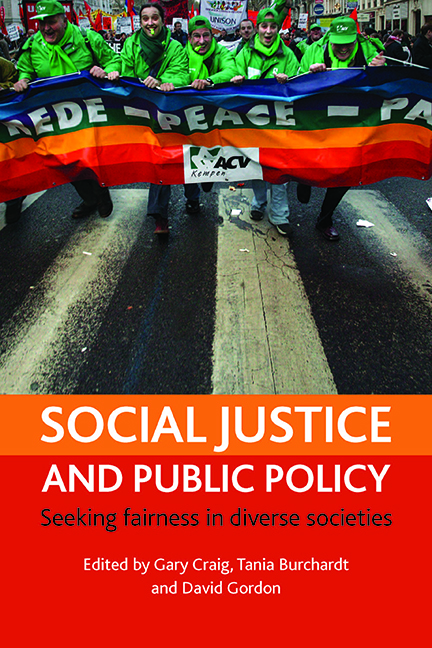Book contents
- Frontmatter
- Dedication
- Contents
- Acknowledgements
- Notes on contributors
- Introduction
- one Social justice and public policy: a view from political philosophy
- two Social justice and public policy: a social policy perspective
- three Multiculturalism, social justice and the welfare state
- four Structural injustice and the politics of difference
- five Recognition and voice: the challenge for social justice
- six Globalisation, social justice and the politics of aid
- seven Social justice and the family
- eight Children, policy and social justice
- nine Social justice in the UK: one route or four?
- ten Monitoring inequality: putting the capability approach to work
- eleven The limits of compromise? Social justice, ‘race’ and multiculturalism
- twelve Understanding environmental justice: making the connection between sustainable development and social justice
nine - Social justice in the UK: one route or four?
Published online by Cambridge University Press: 19 January 2022
- Frontmatter
- Dedication
- Contents
- Acknowledgements
- Notes on contributors
- Introduction
- one Social justice and public policy: a view from political philosophy
- two Social justice and public policy: a social policy perspective
- three Multiculturalism, social justice and the welfare state
- four Structural injustice and the politics of difference
- five Recognition and voice: the challenge for social justice
- six Globalisation, social justice and the politics of aid
- seven Social justice and the family
- eight Children, policy and social justice
- nine Social justice in the UK: one route or four?
- ten Monitoring inequality: putting the capability approach to work
- eleven The limits of compromise? Social justice, ‘race’ and multiculturalism
- twelve Understanding environmental justice: making the connection between sustainable development and social justice
Summary
You can't have Scotland doing something different from the rest of Britain. (Tony Blair, on tuition fees policy, quoted in Ashdown, 2001, p 446)
Devolution to Scotland, Wales and Northern Ireland was one of the earliest and most radical Acts of the 1997 Labour government, opening up new and more democratically legitimate centres of decision-making power in Edinburgh, Cardiff and Belfast. Such constitutional changes are often regarded as dry, arcane matters of interest to a select few. But constitutional changes can have profound implications for policy and practice. Since the devolved administrations came into being in 1999, the achievement of overarching aspirations – such as progressing social justice – have required a different approach, one that takes account of policy differences in different parts of the UK.
For many, devolution to the nations of Scotland and Wales embodied a recognition of the different cultural and national identities in the multinational state that constitutes Great Britain. The debates that took place in the run-up to the referendums in 1997 focused heavily on creating a new kind of inclusive politics, voice, representation and, particularly in the case of Scotland, national identity. In terms of social justice, the issues that the debate turned on sat well within the more recent pluralistic approach to social justice, with its concern for representation and recognition of different groups (Fraser, 2003; Chapter Five, this volume). The referendum debates paid less attention to the consequences of the greater policy divergence that devolution could bring. The debate in Northern Ireland was somewhat different, with conflict resolution acting as the key driver of devolution. The circumstances in Northern Ireland are exceptional, with the project stalling and restarting a number of times, meaning that devolution has been interspersed with periods of suspension and the re-imposition of direct rule. As a result, Northern Irish policies will not be discussed in detail here.
Finding local solutions to local problems and addressing specific territorial needs is a key rationale for devolution. Devolution of powers can create opportunities for policy experimentation, innovation and learning, with new and successful ideas shared. In this sense, devolution is said to create ‘policy laboratories’.
- Type
- Chapter
- Information
- Social Justice and Public PolicySeeking Fairness in Diverse Societies, pp. 181 - 204Publisher: Bristol University PressPrint publication year: 2008



